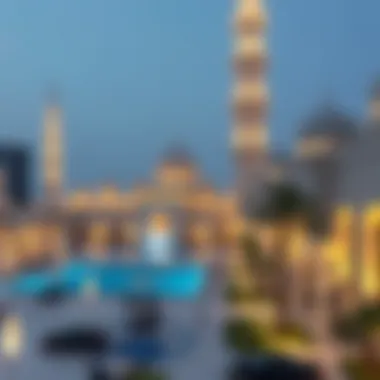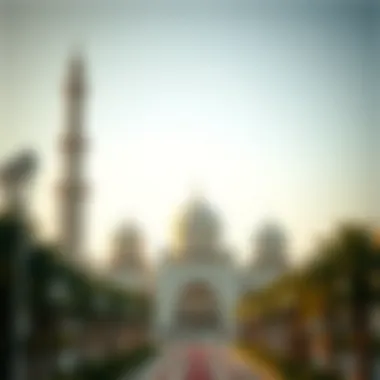Public Holidays in the UAE: A 2023 Guide


Intro
The United Arab Emirates, a vibrant tapestry of culture and tradition, showcases its rich heritage through its public holidays. Each holiday serves not just as a day of rest but as a pointer toward significant historical events, cultural practices, and religious observances. Understanding the public holidays in the UAE is crucial, particularly for investors and homeowners nestled in the bustling heart of cities like Dubai. This narrative illuminates the public holidays of 2023, offering a window into their significance and the broader implications they hold for market trends and lifestyle experiences.
In this guide, we will journey through the key holidays, examining their unique customs and importance. We will peel back the layers to understand how these observances can shift market dynamics and affect daily life in the UAE. Whether you are a seasoned investor or a new buyer, grasping these insights can help you navigate the ever-evolving economic landscape of the Emirates.
Market Insights
Current Market Trends
The UAE's real estate market remains resilient, even amid global fluctuations. Public holidays can significantly influence this sector. For instance, during major holidays like Eid Al Fitr, there's typically a surge in demand for short-term rentals as families and tourists flock to the country. Investors have noticed a pattern: properties in prime locations tend to appreciate faster during these periods.
- The week leading up to Eid often sees heightened interest in luxury villas and waterfront apartments.
- National holidays, like the UAE National Day, are coupled with festivities that include fireworks, attracting both local and international visitors.
The changing landscape of public holidays offers investors a lens into when to strategize purchases or capitalize on rental opportunities.
Future Projections
Looking ahead, shifts in how holidays fall on the calendar could reshape market accessibility. For instance, if a holiday falls on a weekend, the potential for extended celebrations can result in a longer vacation period for residents. This increases societal engagement and the demand for leisure properties. Moreover, as the UAE continues to position itself as a global hub, we might witness increasing diversity in holiday observances, potentially leading to new market segments.
"Understanding holiday dynamics can offer a competitive edge in the fast-paced real estate market of the UAE."
Investment Strategies
Best Practices for Buying Luxury Property
When purchasing luxury property in the UAE, especially around major holidays, being strategic is paramount. Here are some best practices:
- Timing Your Purchase: Align your purchasing strategy with public holidays to leverage reduced competition in the market.
- Market Research: Stay updated on how different holidays impact buyer behavior and property values. Analyzing trends can help identify optimal purchase times.
- Networking: Attend holiday events to network with other investors and real estate professionals. Such interactions can yield insight and opportunities that may not be publicly listed.
Rental Yield Insights
In terms of rental properties, understanding holiday seasons can also yield significant insights:
- Demand often peaks around Eid and National Day, making these ideal times for landlords to hike rental prices slightly.
- Properties near popular tourist attractions can secure higher rental yields, particularly during festive periods.
By being attuned to the rhythms of the holiday calendar, investors can maximize their returns while contributing to the ever-vibrant lifestyle that defines the UAE.
In summary, the public holidays in the UAE for 2023 not only serve to enrich cultural experiences but also provide valuable insights for those looking to invest in this dynamic real estate market. As you navigate these events, staying informed will empower you to make smarter, more strategic decisions.
Understanding Public Holidays in the UAE
Public holidays in the United Arab Emirates play a crucial role in shaping both the cultural fabric and the economic landscape of the nation. Understanding these holidays helps investors and individuals navigate the local customs, which can be a game changer especially when considering real estate ventures or business operations. Being aware of the public holidays allows stakeholders to align their strategies with the rhythms of the society, ensuring they do not miss opportunities brought forth by local celebrations and gatherings.
Significance of Public Holidays


Public holidays in the UAE are not merely days off work; they carry deep significance tied to religious, national, and cultural heritage. For instance, holidays like Eid al-Fitr signify the end of Ramadan, a period of fasting and reflection, symbolizing renewal and generosity. Similarly, UAE National Day, observed on December 2, celebrates the union of the seven emirates, fostering a sense of national pride.
As investors or potential homeowners, recognizing the significance of these celebrations can provide insights into consumer behavior and community sentiment. During holidays, for example, the real estate market tends to see increased activity, as families often take advantage of the time off to visit properties, leading to potential sales. It is this interconnection between public holidays and market dynamics that makes understanding these days essential.
Cultural Impact on Society
The cultural landscape of the UAE is incredibly vibrant, and public holidays serve as a showcase for this diversity. They not just mark formal occasions but are also deeply woven into the daily lives of the people. On Eid al-Adha, for instance, families engage in the practice of sacrificing animals, which is deeply symbolic of charity and gratitude. This isn't just a ritual; it's a community event, bringing people together in acts of kindness and sharing.
Local customs surrounding these holidays heavily influence the manner in which businesses operate. Real estate agents may tailor their marketing approaches during these times to align with festive sentiments. For example, a beautiful villa that offers space for family gatherings may attract more attention during Eid, when many families are looking to celebrate together.
Government Regulations
The UAE's government plays a pivotal role in determining the public holidays observed throughout the year. Each holiday is officially announced and there are sometimes last-minute changes based on lunar sightings or official proclamations. This governmental aspect is significant, as it also influences business operations and employment policies across sectors.
Companies often adjust their operational schedules in accordance with these holidays, which can impact project timelines and employee availability. Investors should be mindful of how these regulations might affect property transactions or project completions. As such, understanding when these holidays fall and the legal implications surrounding them is vital for making informed, strategic decisions.
Overall, a nuanced grasp of public holidays in UAE helps in navigating the local market more effectively, shaping strategies that accommodate both cultural expectations and commercial opportunities.
List of Public Holidays
Public holidays in the UAE hold a unique blend of significance, heritage, and community spirit. These days are not merely a respite from work but are steeped in cultural richness and contribute significantly to the local economy and societal cohesion. For investors and homeowners, understanding these holidays can inform better planning in terms of property rentals and business operations.
New Year's Day
New Year's Day, celebrated on January 1st, marks the commencement of the Gregorian calendar year. While it may appear straightforward, the day is often brimming with hope and rejuvenation. Residents frequently partake in fireworks displays, family gatherings, and community events. The celebratory mood is palpable, and for real estate sectors, this day can witness spikes in hospitality and tourism activities, underpinning the role of the UAE as a travel destination.
Eid al-Fitr
Eid al-Fitr, celebrated at the conclusion of Ramadan, signifies joy and gratitude. The festival, varying in date based on the lunar calendar, is a time for families to come together and engage in acts of charity. Traditional meals filled with sweets are a highlight, while communal prayers reflect unity among the Muslim community. It's crucial for commercial sectors to prepare for this period as shopping sprees and hospitality thrive, thus impacting the local economy favorably.
Arafat Day
Arafat Day, occurring on the 9th day of Dhu al-Hijjah, holds profound importance as it marks the climax of the Hajj pilgrimage. The day is symbolic of reflection and recommitment for Muslims. Many people engage in fasting and praying, hoping for forgiveness and blessings. While it may not be a day of festivities, its significance should not be underestimated in cultural discussions, as this observance often draws attention to local community gatherings.
Eid al-Adha
Eid al-Adha follows Arafat Day and celebrates the willingness of Ibrahim to sacrifice his son as an act of obedience to God. Celebrations involve specific prayers, family feasts, and charitable donations, with the butchering of livestock marking this occasion. For local businesses, this holiday triggers a surge in meat sales and culinary tourism, making it essential for the retail sector to strategize accordingly.
Hijri New Year
Hijri New Year, or the Islamic New Year, marks the beginning of the lunar calendar month of Muharram. Unlike the Gregorian New Year, this observance is quieter. Many reflect on the lessons learned in previous years. It's worth noting that although celebrations are modest, it provides a chance for communities to engage in discussions about their aspirations for the coming year, subtly influencing local social dynamics.
Prophet Muhammad's Birthday
The observance of Prophet Muhammad's Birthday (Mawlid al-Nabi) celebrates the life and teachings of the Prophet. Celebrated on the 12th of Rabi' al-Awwal, the day often comprises various activities including lectures, gatherings, and charitable acts. This holiday brings a sense of respite and reflects the deep respect held for the Prophet, highlighting the cultural landscape in which these public observances take place. Investors should recognize the potential for community events, enhancing cultural tourism during this time.
UAE National Day


UAE National Day is celebrated annually on December 2nd, marking the union of the seven emirates in 1971. This day features parades, fireworks, and celebrations that showcase the nation's pride. It serves as a pivotal moment for the nation, and businesses often prepare special promotions to attract customers. The economic impact is significant, especially in retail and tourism, making it essential knowledge for anyone engaged in the local market.
Detailed Insights into Each Holiday
Understanding the public holidays in the UAE involves more than merely knowing the dates. Each holiday encapsulates rich history, cultural depth, and a plethora of celebrations that reflect the nation’s identity and values. This section serves to unravel the layers behind these holidays; it’s where historical context, cultural celebrations, and traditional practices converge, shedding light on the significance they hold for residents and visitors alike.
Historical Context
Each holiday in the UAE has roots that extend back to crucial moments in history. For instance, Eid al-Fitr, which marks the end of Ramadan, resonates with a sense of completion and gratitude. Its origins lie in the Islamic tradition, reminding Muslims of the significance of self-discipline and charity, values deeply embedded in the cultural fabric of the UAE. The UAE National Day on December 2 is another vital marker, commemorating the unification of the emirates in 1971. The celebrations bring together people from various backgrounds, showcasing a sense of national pride grounded in history.
To explore these historical narratives further, one might visit Wikipedia which hosts an array of details about these holidays that continue to shape the society.
Cultural Celebrations
Celebrations during these holidays are vibrant and full of unique local customs. For example, Eid al-Adha, known as the "Festival of Sacrifice," is marked by the tradition of Qurbani, where families share meat with those less fortunate, embodying generosity and community spirit. On the other hand, the Prophet Muhammad's Birthday sees gatherings in mosques, coupled with recitations and prayers, fostering spiritual growth and communal bonding.
During UAE National Day, the entire country adopts a festive spirit, with fireworks and elaborate parades that encapsulate the rich history of the nation through music, art, and dance. Such celebrations foster a sense of belonging and unity among residents, reflecting the diverse cultural tapestry the UAE is known for.
Traditional Practices
The traditional aspects surrounding these holidays are what make them memorable. For instance, during Arafat Day, many Muslims embark on pilgrimage to Mecca, participating in the rituals that signify humility and obedience. Festivities continue with local customs like sharing dates and coffee after prayers, which symbolize hospitality, a key element of Emirati culture.
Eid al-Fitr also boasts special traditional meals prepared for families, highlighting dishes such as harees and majboos, which are often shared with neighbors and friends. Such practices serve to strengthen familial bonds and encourage community participation, illustrating how holidays become catalysts for reinforcing relationships.
In summary, the detailed insights into each holiday reveal a mosaic of history, cultural practices, and community engagement. The significance of these holidays transcends mere days off; they are woven intricately into the lives of the people, shaping their identities and societal values.
As one celebrates these holidays, both residents and visitors find themselves not just observing traditions but actively participating in the ongoing narrative of the UAE's rich cultural landscape.
Public Holidays and Business Operations
Public holidays hold a significant role in shaping the operational landscape of businesses in the UAE. Understanding how these days impact commerce is crucial for various stakeholders like investors, realtors, developers, and buyers who navigat the intricacies of the local market. With the holiday calendar punctuated by celebrations that resonate deeply with the cultural identity, businesses must adapt their strategies accordingly to stay competitive.
Impact on the Real Estate Sector
The real estate sector in the UAE is particularly sensitive to the timing of public holidays. Developers and investors must consider how holiday observances can influence buyer behavior and market dynamics. During periods like Eid al-Fitr, there is typically an uptick in consumer activity. Families often engage in home renovations, purchasing new properties, or investing in holiday homes, as these holidays come with an increase in disposable income after the fasting month.
This surge creates opportunities for property appraisal and sales, further necessitating a strategic marketing approach that capitalizes on the festive atmosphere. For example, the successful campaigns often showcase properties in proximity to cultural centers and leisure facilities, popular during the festive celebrations.
Adjustments in Office Hours
Another critical aspect of public holidays in the UAE involves changes to standard office hours. Most companies will adjust their schedules to accommodate extended holiday periods. For instance, during Eid, employees may find themselves enjoying several days off, while businesses tend to close for a longer duration. This can cause a ripple effect throughout the business ecosystem.
For investors, understanding these changes helps in planning meetings, negotiations, and transactions. It’s advised to check permissible working hours in advance. Clients and partners appreciate timely communication regarding availability. Being transparent about operational hours during public holidays enhances relationships and can foster trust.
Commercial Activities During Holidays
Holidays present opportunities and challenges for commercial activities. Many businesses utilize these celebrations to launch promotions and holiday-themed events. Retail outlets especially ramp up their marketing strategies, given that consumers are more likely to make purchases during festive times.


- Promotional Strategies: Many online platforms, like noon.com and souq.com, thrive during holiday seasons and often see an increase in traffic due to attractive deals.
- Cultural Events: Public festivities often include events that draw in crowds, allowing for cross-promotion between enterprises and entertainment sectors. For example, during National Day, community events enhance visibility for local businesses.
It’s important for companies to understand the unique dynamics of each holiday. By keeping an eye on local customs and investing in marketing tailored to these occasions, businesses can position themselves advantageously in the eyes of consumers.
"Navigating public holidays in the UAE requires a nuanced understanding of the cultural and commercial implications, highly beneficial for achieving business resilience."
Ultimately, effectively managing operations around public holidays not only ensures compliance with regulations but also enhances consumer engagement, paving the way for success in the dynamic landscape of the UAE's economy.
How Public Holidays Influence Local Culture
Public holidays in the UAE are not merely days off from work or school; they represent a weaving of cultural threads that bind the people together. These occasions reflect the values, traditions, and beliefs of the society. Understanding how these holidays shape local culture is crucial for anyone looking to invest, develop or buy within this vibrant landscape.
The fabric of Emirati society is rich with varied traditions influenced by history, religion, and the collective experiences of its diverse population. During public holidays, the atmosphere transforms, giving rise to communal and familial festivities that strengthen bonds and foster a sense of belonging among residents.
Community Engagement
Holidays provide an excellent opportunity for community engagement. From neighborhood festivals to national celebrations, public holidays catalyze gatherings that encourage people to come together, share experiences, and celebrate their culture. Activities such as Emirati dances, traditional music performances, and local food fairs come alive during these times.
Moreover, public holidays often serve as platforms for local artists and craftspeople to showcase their work. For instance, during Eid al-Fitr, you might find artisan markets springing up, featuring traditional crafts, clothing, and heirloom recipes. These events do more than just entertain; they kindle appreciation for local arts and increase community involvement in sustaining cultural legacies.
Additionally, festivals during public holidays can enhance social cohesion. Residents find common ground, regardless of their backgrounds, by participating in shared experiences.
In turn, this collective celebration leads to deeper ties within communities. It creates a ripple effect that not only instills pride in local culture but also attracts business interest and tourism.
Visitor Experiences
Public holidays in the UAE are an enticing draw for tourists. Visitors often find themselves at the heart of the bustling festivities and cultural displays. This not only allows them to experience the unique traditions of the UAE but also offers insights into the historic, social, and religious influences that shape everyday life.
For tourists, events like the UAE National Day provide a peek into the fervent national pride that pulses through the emirates. Street parades, fireworks displays, and cultural exhibitions showcase the grandeur and uniqueness of Emirati heritage — a visual and experiential feast that leaves lasting impressions.
Tour operators often tailor their packages around such public holidays, inviting curious travelers to partake in exclusive activities. Visitors can engage in traditional cooking classes during Ramadan or attend mosque open days. Experiences like these deepen their understanding and appreciation of local customs.
"Public holidays allow visitors to connect with a culture in a way that everyday experiences may not. Those who immerse themselves in these occasions are rewarded with a richer narrative of their destination."
Lastly, public holidays in the UAE stand as testaments to the nation’s commitment to unity in diversity. Different cultures blend together to create a festive atmosphere where all can thrive. This unity is not just a cultural phenomenon; it has significant implications for real estate, tourism, and commercial ventures as more people seek to take part in this cultural tapestry.
In summary, the influence of public holidays on local culture in the UAE is profound. They foster community engagement and enrich visitor experiences, making them fundamental aspects of the intricate cultural landscape. Such holidays not only celebrate the past and present but also shape future opportunities in investment and growth.
Culmination
Public holidays in the UAE carry a significance that wells beyond mere days off from work; they weave deep threads into the social and cultural fabric of the nation. The observance of these holidays enhances the sense of community and national identity, providing opportunities for family gatherings and communal activities. Understanding the nuances of each public holiday gives both residents and visitors critical insights into the local traditions and values, fostering a greater appreciation for the rich Emirati culture.
Importance of Awareness
Awareness of public holidays is crucial for multiple reasons. For locals, it’s about embracing the essence of their culture and participating in cherished traditions. It represents an invitation to reflect on historical events, engaging more deeply with the stories that shape their identity. For visitors and new residents, comprehending these holidays means navigating social norms and expectations effectively. This understanding helps in forging connections within the community.
So, whether it’s planning around holidays for travel, business operations, or simply participating in festivities, a well-rounded knowledge is invaluable.
Future of Public Holidays in the UAE
As the UAE continues to develop both economically and culturally, the nature of public holidays might evolve. There’s a growing trend towards inclusivity, reflecting the diverse population that the UAE hosts. Future public holidays could see the recognition of different cultures and traditions, promoting a spirit of unity among various communities.
This evolution may also involve modern interpretations of existing holidays or the introduction of new days of significance. Investors and businesses will need to remain adaptable, as public perception and celebrations can influence market trends. The sentiments surrounding these changes can affect the real estate landscape, where there's heightened demand for properties that facilitate community engagement during these holidays.
With innovation at its core, the UAE has the potential to redefine how public holidays are understood and celebrated in years to come, fostering a more integrated society that respects and values its rich tapestry of cultures.











